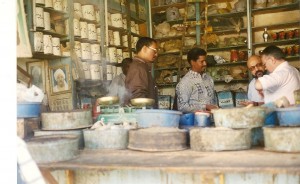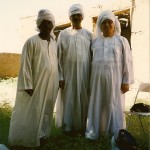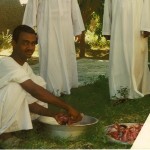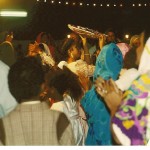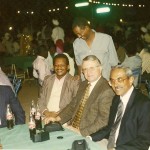Savaging Sudan
“Thus ended the Battle of Omdurman—the most signal triumph ever gained by the arms of science over barbarians[1]. Within the space of five hours the strongest and best-armed savage army yet arrayed against a modern European Power had been destroyed and dispersed, with hardly any difficulty, comparatively small risk, and insignificant loss to the victors.”
Winston Churchill writing on the Battle of Omdurman, Sudan, in 1898.
I was warned against working in Sudan on a UN project in 1995 by my friends and my mother. It was a dangerous terrorist state. The international media had been savaging Sudan for quite a while and it is the main source of information for most of us. But I did not heed my mother. Parental control is vastly diminished when you are over sixty years of age. So I went to Sudan.
I made three visits to Sudan on UN work, in 1995/6, 2007 and 2009, and missed seeing this demonic behaviour, either by the government or the people. These visits in an official capacity gave me the opportunity to meet with several cabinet ministers and senior officials and travel in the country. Sudan was not a well-governed country: the administration and public institutions were incompetent and at times borders on the chaotic. But it was a country trying to cope with enormous political problems, rebellions and infighting between various tribal groupings in the South and in the Western Regions where the writ of the government was tenuous at best. North Sudan, or the traditional Sudan proper, on the other hand, was a peaceful region that was perfectly safe to live in.
Sudan, like the rest of Africa, had been subjected to the depredations of Western imperial powers that occupied the continent, subjugated and partly enslaved its people, carved up states irrespective of existing boundaries, and exploited its material resources without making significant inputs for economic or political sustainability. When they left the continent in the decades after World War 2 by giving self-rule to their territories, they did not leave behind a competent ruling classes or politically viable nation states. Within a decade, most elected governments had been seized by military dictators and adventurers. So began the second phase of imperial dominance when imperial powers, including the former Soviet Union, vied to install obedient vassals as dictators through the supply of military assistance and financial aid to their clients in these countries.
Sudan was saddled with two deadly rebellions: one in the Southern region, now declared an independent state, and the other in the Western region. Neither of these regions was part the original Sudan proper. The tribes in the Southern regions were governed by Belgium as an extension of their empire in Zaire and ceded to British Sudan in 1892. The Western region was part of the French West African Empire and was ceded to the British in 1899. In 1917, this region which was the Sultanate of Fur (the Fur were the major tribe) was incorporated with Sudan and was known as Darfur.
The accretion of these two appendages to Sudan left it the largest territorial state in Africa with some of the largest problems of nation building. The effort to integrate these regions has failed: because of heavily armed rebel movements in the South and centuries of tribal friction in the West for control of the dwindling water wells, a process exacerbated by global climate change and the inflow of modern weapons which makes warfare in Africa more destructive and rebels harder to subdue.
The Southern Sudanese tribes have little in common with Northern Sudan in terms of religion, culture and language and rebelled against the government from the earliest stages. It later developed a formidable rebel army that challenged the North with tanks and artillery, thanks to Western benefactors who supplied weapons through clients in Uganda. None of these benefactors nor the rebel leaders, who travel in helicopters and live in wealth , have done much to improve the condition of the people of the South who live in desperate poverty and are constantly ravaged by war. Two million refugees, some displaced three decades ago, lived in Internally Displaced Persons (IDPs, as the UN calls these people) camps in Khartoum State and in the North some of which I visited.
By the time of our second visit in 2007 the peace agreement with the Southern People’s Liberation Movement (SPLM) in 2005 had brought in a cessation of fighting by the inclusion of the rebel leaders as cabinet ministers in the Government of Sudan with all the privileges these offices carry[2]. Southern Sudan then became an autonomous state and its President was the Vice-President of Sudan and many other Southern political leaders were cabinet ministers. But even these gentlemen seemed only mildly concerned with the fate of their poor fellow Southerners and those in the IDP camps.
While the peace settlement with the South was under way in 2003, the tribes in the Darfur region in the West rebelled again. Settlement of these demands by the rebellious groups is complicated because there is no single rebel movement to deal with. The rebels in the South have at least two major factions while the groupings in the West number at least 80 tribes or clan groups. There are nomadic and sedentary communities among them and they are broadly categorised as fully Arabic, partly Arabic or non-Arabic. The definition of Arab or non-Arab is based on language use and cultural habits, not race. The Darfur humanitarian crisis, designated the Sudanese genocide in the West, is in the forefront of international attention and is now the main weapon to bludgeon the government of Sudan.
Genocide in Darfur is a popular media headline. But the problems in Darfur, we discovered, go back many centuries and has its basis in ecology, not in race or religion as made out by the Western media and politicians. It is a vast desert and semi-desert region where small scattered tribes have tried to eke out a living around the waterholes. With increasing global climate change and Saharan desertification, the traditional competition for the waterholes, which are now diminishing, have become murderous. At the same time, over-grazing due to the increasing number of animal herds required with increasing population has led to conflicts between herding tribes and sedentary farming tribes. Instead of lancers and muskets, the tribes are now armed with assault rifles. Several armed groups also now make a living out of plunder rather than agriculture or herding. Even African peacekeeping forces have failed to pacify this vast sparsely populated region. Several UN and other aid workers have been targeted. One of the requirements for UN consultants in Sudan was to pass a very detailed security clearance examination which required us to learn how to behave when attacked or captured by armed bandits!
North Sudan stands out in my mind for other reasons. The Sudanese are the most hospitable people I encountered in Sub-Saharan Africa during two decades of work in the continent. Sub-Saharan African colleagues and associates are not usually given to entertaining foreigners, even though they show a lot of camaraderie. But Sudanese are different and in this respect are closer to North Africans and Middle Easterners. During visits, ordinary Sudanese associates who survived on small incomes, opened their homes for family dinners and even took us on week-end picnics at their expense. One week-end picnic on the banks of the Nile stands out in my mind. Our host was a university professor. We were taken to his house where the household staff loaded a truck with foodstuffs, fresh vegetab
les, pots and pans, and finally a big trussed up goat. Arriving at the picnic spot about 150 kilometres from Khartoum, the goods were all unloaded and the staff kneeled down to pray. My colleague, a Turkish professor, urged me to join him in a walk away from the scene. When we returned, there was the large fresh goat skin and the cooks were busy making different dishes with the goat meat. I lost my appetite for the meal and told my colleague that I was a vegetarian on this day. But there was no way out: he rightly pointed out that this would insult our host. Eventually, we ate a delicious meal and frankly enjoyed it.
The other feature of Sudan that impressed us was that it is one of the safest countries in the world to work in. Most large American cities have areas where law-abiding people will not venture into, with foreigners running even higher risks. But the risk of personal violence or harassment, ever present in most of Sub-Saharan Africa, is absent in Sudan, except in the war zones of Darfur. It is also free of thieving, an ever present danger in most of Africa. The Sharia laws are severe, and are even more severe against anyone who harasses foreigners. But culture, not deterrent, is the main reason for their law-abiding nature.
Sudan was a troubled country during my first visit in 1995/6. Hassan al-Turabi, (Dr. Hassan al-Tourabi, Ph.D Law from Sorbonne University of Paris, M.A. Law from University of London), leader of the National Islamic Front and ally of the al-Qaeda terror group and of Osama bin Laden, was a major power in Sudanese politics and Speaker of the National Assembly. He had his own militia groups, was highly critical both of the West and the Sudanese government which feared him. His supporters were seen at times in Khartoum and Omdurman riding open trucks, waving rifles and religious flags and shouting political slogans. He is now a bitter opponent of the government and leads the Justice & Equality Movement (JEM) claiming to represent the Darfur rebels. This former Osama bin Laden supporter is now portrayed very favourably in the Western media as a credible opposition leader.
It was in relation to this man that in 1996 I encountered a leading member of the Sri Lankan terror group, the Liberation Tigers of Tamil Eelam[3] or the LTTE as they are commonly known, V. Padmanabhan. He was the personal guest of Hassan al-Turabi, lodged in the best suite in our hotel and was given a government Mercedes car and chauffeur. He was trying to sell arms in Sudan.
I never knew whether his business in Sudan succeeded as his client lost power shortly afterwards and was imprisoned briefly by the government which was anxious to clean its image and remove the U.S. label of “sponsor of terrorism” and become accepted by the “international community”. But the US is not a forgiving super-power and international policeman. Though Dr. al-Turabi was removed from all offices and Osama bin Laden was expelled from the country in 1996, the USA imposed a trade embargo in 1997. In August 20, 1998, the residents of Khartoum got a fearful message when the brand new Al Sifa pharmaceutical plant was blasted by US cruise missiles on CIA concocted evidence (as later half-heartedly acknowledged) that it was manufacturing VX nerve gas.
As part of our UN project we had visited the 13 largest pharmaceutical companies, including Al Sifa, which was just being completed in 1996 with machinery imported mainly from Europe, India and Thailand and was the most modern of the plants in the country. But President Bill Clinton was under immense pressure at home because of his extra-marital escapades and quickly found scapegoats for the bombing of US embassies in Nairobi and Dar es Salaam by al-Qaeda by bombing sites in Libya, Sudan and Afghanistan. So Khartoum paid the price.
The return of Sudan to its original geographic location, minus the new state of South Sudan and the still troubled Darfur region, would provide a blessing for Sudan. Neither Sudan, nor the Western powers that incorporated Darfur into Sudan in 1917, can solve the problem of Darfur’s inhabitants without transferring a large portion of them out of the expanding desert into a more salubrious region. Darfur can never be pacified by military intervention or peace talks. Its poverty stricken people need better lands to make a living. Should this be a problem for Sudan or the two Western powers that created the original problem? At present, the old Western imperial powers have taken the high ground and imposed trade sanctions on Sudan which makes a solution to the economic problems of Darfur even more difficult.
Kenneth Abeywickrama
15 February 2011
Copyrights to article are reserved. Quotations or prints require the author’s approval.
[1] In his disdain for non-Europeans, the historian in Churchill chose to ignore that Sudan’s civilization and nationhood pre-dated that of his own country by over two milleniums. The Kushite and Meroite kingdoms located in present-day Sudan had a civilization and a form of writing linked with ancient Egypt. Around 750 B.C. the Kushite king, Kashta, briefly conquered Thebes and Upper Egypt. There are more pyramids today in Sudan than in Egypt, though they are much smaller in size than the pyramids of Giza. Recent excavations by British archeologists in Merowe, the site of the new hydro-power dam being constructed by China, revealed that the First Kushite Kingdom rivaled Egypt for power between 2,500-1,500 B.C.
[2] The Abuja peace agreement was brokered by the African Union. The Darfur peace agreements have not held. The SLMA and JEM worked a power sharing agreement but tribal groups and bandit organizations don’t respect these and continue to attack and plunder both government facilities and Western aid organizations. In the confusion, the international media continues to hold the Government of Sudan responsible for all acts of violence.
[3] The CIA rated the LTTE the most dangerous terror outfit in the world.
Comments
Hello, Kenneth – very interesting and informative, fully agree with your comments on Churchill, whom I consider to be one of the most overblown figures in history!
These attitudes live on today and can be seen even in less critical areas of life, such as cricket, where pitches prepared to suit fast bowlers are fine but those prepared to suit spinners are “under-preparared”, “not Test match std.”, etc., etc.!
rgds
dev (menon)

